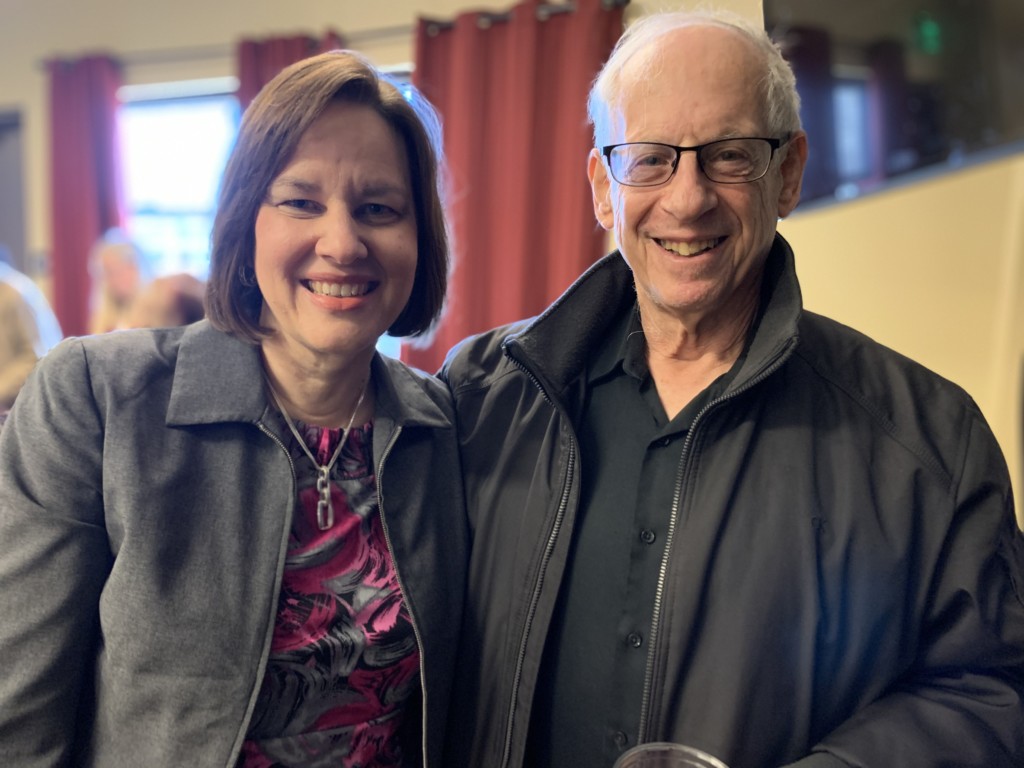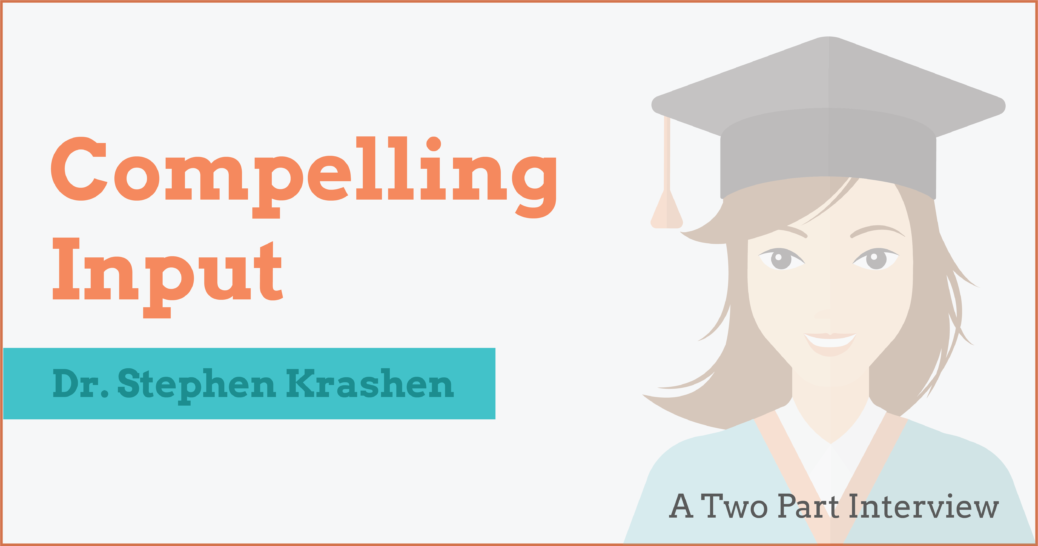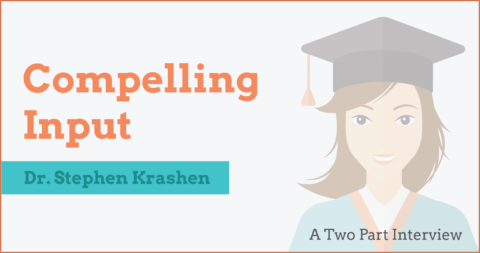Last week kicked off Dr. Mooney’s two-part interview with renowned language acquisition theorist, Dr. Stephen Krashen. In Part One [hyperlink to article], we got a peek into Dr. Krashen’s life outside of work and discussed his views on reading.
Picking up where we left off, Krashen shares some of his origin story and responds to criticisms of his most popular theories with the Dear Dr. Mooney community.
Read closely. There is much we can learn here.
Taking up with the personal side of his professional pursuits, I asked something I’ve always wondered…
Angela Mooney (AM) – Tell me a little bit about your background. How did language acquisition theories come to be a focus of your professional life?
Stephen Krashen (SK) – Let me quote a famous coach who said some people are born on third base, and they spend their whole lives telling everyone they hit a triple. Not in my case. I would like to tell you my story of coming up from nowhere, fighting against the odds. Heroic. But it’s not true.
I had every single advantage. I am one of the most privileged people you have ever met. Not fabulously rich, but always well off. Total home support. Nearly a complete lack of any family pathology. Support all the way, and I think it’s up to people like me to point this out. If I had grown up working class or underclass, I don’t think I would have come close. It’s that hard, and even with all of the advantages, it wasn’t easy.
I got my introduction to languages because my parents gave me the gift of a free bicycle trip to Europe at the end of my first year of college. I went off with a group, riding bicycles throughout Europe, staying in different places. They supported a year in Europe, and I studied piano. So I got exposed to many things [including languages].
AM – What made you interested in these ideas of language acquisition – the affective filter, comprehensible input, etc. Why? What were you doing that those kinds of things came to you?
SK – I was a supporter of traditional methodology. I wrote papers. My early papers were about the contributions of instruction, including isolating the rules, giving them feedback, etc.. Then we did a couple of experiments which changed things.
Two studies. Study #1 was one of my students when I was teaching at Queens College. A woman in her 40s in our graduate program whose English was quite good. She was a native speaker of Chinese. For her term paper, her son, who was a native English speaker, left slips of paper in the apartment and jotted down her casual mistakes in English. She then examined them. We examined them together. She could correct nearly every single one of them. She knew the rules, so that meant to me – we didn’t have the terms learning/acquisition then – but I started thinking, there must be two systems. Also our first study showed there’s a natural order, and you only get it in a communicative situation. When you put focus on form, it just disappears. That was the beginning [of my thinking] that there were two different systems [of language].
AM – When was that?
SK – That was in the 1970s. 1975, around there.
AM – There were a lot of other researchers starting to do those types of things at that point, right?
SK – (laughs) No.
AM – Well, I’m thinking of [Heidi C.] Dulay and [Marina K.] Burt.
SK – Oh, Dulay and Burt. Let me tell you about them. Here’s the sequence. Roger Brown got the natural order for first language. [Ref. 1 below] Dulay and Burt are good for second language. We [N. Bailey, C. Madden, & S. Krashen] got it for adult second language.
Now, an interesting story. Dulay and Burt and I taught a course together in 1976 when we were first getting into this. They were sooo careful in their lesson planning things. To me, it was like a tutorial. Both brilliant. They both helped me think things through, and that pushed me. The affective filter [hypothesis] is their idea 100%. [Ref. 2 below] I try to give them credit, but nobody pays attention. I try to correct people. We did a book together, and then they disappeared.
About 2 months ago, I discovered the name of a Heidi Dulay who was a health counselor on fitness and nutrition. She had written a book. I bought it. It’s brilliant, especially the chapter on coffee. Eating smart and stuff like that. Turns out she lives a couple of miles from me. We’re going to get together. I wrote her and said, “This is a great book!” Heidi Dulay is still brilliant in my opinion. But you were right, they were a powerful, powerful influence [in the second language acquisition field].
AM – I know they’re still quoted in the textbooks.
SK – Oh definitely. For good reason.
Articles definitely worth reading:
(1) Brown, R. (1973). A first language: The early stages. Cambridge, MA: Harvard University Press.
(2) Dulay, H.C., & Burt, M.K. (1977). Remarks on creativity in language acquisition. In M.K. Burt & M. Finocchiaro (Eds.), Viewpoints on English as a second language (pp. 95-126). New York: Regents.
Next, Dr. Krashen reveals why he now gives away virtually all his work for free – and how the Grateful Dead factored into it…
AM – You have said that scholars need to write shorter papers on language acquisition and to publish in open-access journals. I know that you put everything for free on your website. Can you give us a little rationale for those ideas?
SK – Yes. Yes. First of all, this all happened to me in 2009 when I was invited to put an article in an edited book called Input Matters. It was right that they invite me, because I was the input guy. So I wrote this article. I had a really good time. It included all the second language stuff, first language stuff, literacy stuff…It came out. The book sold for $165 hardcover. I couldn’t afford copies for my relatives at author’s discount, and I found out all the other books were costing that much. The same publisher – I won’t mention any names – (slyly) Multilingual Matters – Had a book called Language and Poverty – $165. The irony was lost on them. Nobody can afford that stuff.
So, that’s when I declared war. I said I can’t do this. I can’t afford it… I looked at my tax return, at how much I was spending on journals. Thousands of dollars. No wonder I didn’t have any money! Nobody can afford this stuff. So, they have you captive. You can’t get tenure without it [publishing scholarly articles]. If you’re not at a university, you don’t have access to this stuff. If you do publish in one of these books, no one is going to buy it. Your work is lost. Doomed to oblivion. That’s when I started thinking about it and after a couple of years, I made a full switch.
AM – Have you been able to put all of your published articles on your website or do some journals still hold rights to them?
SK – Yes….no…well, the old ones. I can’t pull them out [of the journals], but all my ones in the last 7-8 years are open access. Free download.
I was also inspired by the Grateful Dead. Remember them? The days when the Dead were touring, there was concern about piracy. People recording at concerts, but the Grateful Dead turned it around. They started their concerts by saying, “You want to record us? Go ahead. Take out your recorders. You want to give it to your cousin? Go ahead. We love it!” They decided to make money by touring, not by selling.
I don’t know how I’m going to make money, but it’s not going to be from writing these articles. It’s not going to be writing technical books, which don’t sell anyway. Nobody makes money on that unless you get lucky and someone uses it as a textbook.
AM – Right, and most people don’t have access to academic journals or the funds to purchase the books. That’s one reason why I decided to create Dear Dr. Mooney. I knew I could spend months writing an article to submit to a journal that may or may not ever be published…
SK – And if they publish it, no one is going to read it anyway.
AM – Right. So, instead, I am publishing short articles on Dear Dr. Mooney, and I’ve talked to a lot of teachers that are reading them. We need to get the information out there.
SK – So, we’re on the same team.
AM – We’re all very grateful you’re providing that example for us.
No interview with Stephen Krashen would be complete without bringing up one of his most redeeming qualities: controversial concepts!
AM – An important part of your Comprehensible Input hypothesis is that language input should be just above a student’s current level. You call it i + 1. Some have criticized this idea because they say we can’t know a student’s i + 1, so how do we teach toward it. How do you respond to that criticism?
SK – You don’t. Give them lots of comprehensible input, and i+1 is there. It’s similar to the fact that we have not discovered all the vitamins, but if we give people a good reasonable diet, we can be pretty sure [the vitamins are] there and in the right proportion.
AM – Related to this, you’ve talked about the net hypothesis. Can you explain what you mean by this?
SK – If you give people comprehensible input, it casts a net of structures, which includes the i+1. It’s always there. If it weren’t, people could never acquire language.
AM – So, then people will take what they need from the input, so to speak?
SK – Always. Even the grammatical rules that haven’t been discovered yet. That’s the answer to the phonics, too. It [everything needed for language acquisition] is all there.
AM – I completely agree. But, I have read other critiques saying comprehensible input is not enough. Output is required, too. How do you respond to that?
SK – Comprehensible output is the hypothesis that we acquire a language by trying to say something. We make a mistake. The other person doesn’t understand, so we correct ourselves, finally they understand, and we acquire language that way. It couldn’t possibly be right.
Number 1 – it doesn’t happen very often. It’s extremely rare. The only time you ever see it is when they set it up in an experimental situation in a classroom.
Number 2, the only study that ever produced any evidence in favor of it, had three subjects and for two of them it had no effect. For one of them, it did, but it’s easy to argue the person was simply monitoring a little better with English in the past tense. So, it [the evidence] is very weak, practically non-existent. It [comprehensible output hypothesis] should never have gotten to first base.
AM – What about second language learners who claim to improve by communicating with native speakers?
SK – No. By listening. Not by communicating. Talking is the result.
AM – So, even if you are talking with somebody, and you can tell they can’t understand what you said, and work to repair the communication breakdown…?
SK – No evidence that it helps. It’s conscious learning when it does. “Oh, I should use this [word or grammatical structure] instead of that.” It plays no role.
AM – Right. So it’s conscious learning, not acquisition.
SK – Right. If it does ever work. I can’t remember in my own experience any instances where it has happened to me in trying all of these languages.
A Couple of Takeaways….
Dr. Krashen’s work has played, and continues to play, a foundational role in second language acquisition theory. Whether or not you believe his hypotheses about how people come to know language, you can’t deny that his thoughts are worth considering.
If you struggle with knowing how to help some of your English learners, think about how you could make the language input in your classroom more comprehensible and your lessons more compelling.
Have you discovered something that works well? Write it up and share it with others. It doesn’t need to be a long, “academic” article to be valuable. Even this renowned scholar is writing short, accessible papers today.
Consider following his lead and share your ideas with the Dear Dr. Mooney community!

Stephen Krashen is professor emeritus at the University of Southern California. He received a PhD. in Linguistics from the University of California, Los Angeles in 1972. Dr. Krashen has more than 486 publications, among papers and books, contributing to the fields of second-language acquisition, bilingual education, and reading. He is known for introducing various hypotheses related to second-language acquisition, including the acquisition-learning hypothesis, the input hypothesis, and the natural order hypothesis. Most recently, Krashen promotes the use of free voluntary reading during second-language acquisition, which he says “is the most powerful tool we have in language education, first and second.” Many of his publications are freely available on his website, http://www.sdkrashen.com. More about Stephen Krashen here and here.


